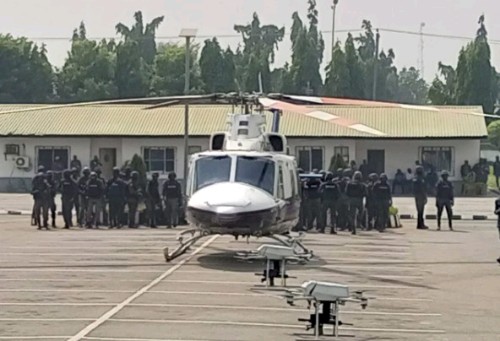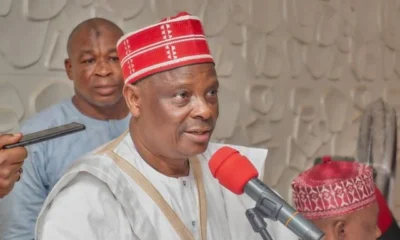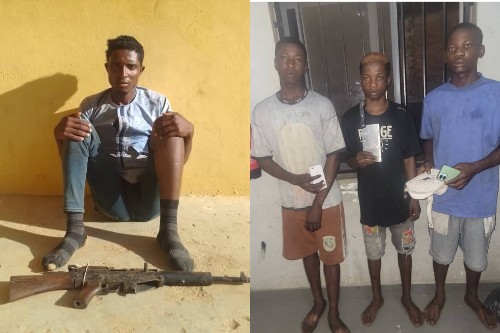Olukayode Egbetokun, the Inspector-General of Police, has launched the Special Intervention Squad in the Federal Capital Territory to curb activities of kidnappers and bandits, especially in border towns within the territory.
According to The Punch, the squad would be in charge of patrolling and securing the communities within the various borders of the FCT, and intervening to curb and mitigate violent attacks in the nation’s capital
The Nigeria Police Force had in late 2023 revealed that deployment of 40,000 operatives of the Special Intervention Squad who were undergoing training would begin with Katsina and nine other states including the FCT.
The Force Headquarters also revealed that the proposed commanders that will be in charge of the squad will be trained in Mexico while noting that the deployment to the 10 carefully selected states is to pilot the activities of the SIS.
Egbetokun, following his assumption of office in June, declared the establishment of the SIS, a maiden project of his administration.
Egbetokun further noted that the SIS would be a standby team of specially trained officers to quickly intervene in large insecurity occurrences, adding that it was part of the priority in his administration’s endeavour to combat the country’s threat of violent crime.
During a recent event in Owerri, the Imo State capital, the IG stated that the other 27 states will immediately follow the 10 pilot states that were selected based on the recent violent crime assessment conducted in the 36 states and the Federal Capital Territory.
Meanwhile, in an exclusive interview with our correspondent, the Force Public Relations Officer, ACP Olumuyiwa Adejobi, noted that the Special Intervention Squad will not operate like the defunct Special Anti-Kidnapping Squad that was notorious for human rights abuses.
The Force spokesperson also revealed that operatives of the SIS which were drawn from the Police Mobile Force, and others would not be involved in escort duties while noting that the squads’ commanders would operate under the command of Commissioners of Police in their respective states.
Adejobi said, “The training of the Special Intervention Squad is still on, and the Inspector General of Police has organized training for the SIS Commanders, in a train-the-trainer course. One is ongoing, and another one will come up in Mexico, and the IG has given approval for that.
“We actually want to have enough training before deployment commences, but we are starting very soon with 10 states, while we then move state by state. We have picked some Commanders and instructors to train them, and those are the people who’ll be going to Mexico for training. And the IG gas got some equipment for the SIS to start operations.
“But we need to clarify that the SIS is not SARS. People have been asking questions whether or not it’ll operat like SARS? No. The SIS are basically operational men, it is majorly Police Mobile Force operatives, CTU operatives, and our tactical squad operatives that’ll come together under the command of a very senior police officer, either an ACP or a CSP that’ll be the commander in each state, and they’re not going to be doing stop and search work or pursuing ‘Yahoo Boys,” they’re specifically for intervention purposes.
“It is only CPs that will call on the commanders to move their men to certain places for intervention. It’s not that a commander would say, oh, these people can pay me well, you guys should move there. That’s not what it’s all about.
“The SIS is a very different squad, and the Standard Operating Procedures and Rules of Engagement are also different, and we are starting very soon. I can confirm that the IG added Katsina State amongst the 10 States, as the Katsina State Governor met with the IG, and also donated some vehicles for the SIS.”
Earlier report had it that following the establishment of the 40,000-man Special Intervention Squad, Egbetokun announced a plan to withdraw Police Mobile Force personnel from VIP escort/guard duties.
Egbetokun who spoke during a meeting with Squadron leaders and Tactical Commanders at the Force Headquarters, said the development was to allow the police to take back its place in the ‘internal security architecture’ of the country.
Meanwhile, while clarifying the misunderstanding in regards to the IG’s directive concerning the proposed withdrawal of the Police Mobile Force from specialised escort and services for VIPs, Adejobi noted that the NPF did not intend to strip VIPs (who are legally and statutorily entitled to police escorts) of their security details, noting that doing so would be unsafe and counterproductive.
He said, “Get the message right: We understand that there has been some misunderstanding regarding the directive of IGP Olukayode Egbetokun about withdrawing members of the Police Mobile Force Unit from Specialized Escort and Services for VIPs. It’s crucial to provide clarifications to address this.
“First and foremost, let us be clear: at no point did the Force intend to strip VIPs (who are legally and statutorily entitled to Police escorts) of their security details. Doing so would be unsafe and counterproductive. Instead, the objective is to reassign the withdrawn PMF personnel to the recently established Special Intervention Squad (SIS).
“For those who genuinely require specialized police escorts, this vital service will continue to be provided by other units of the Force, such as the Special Protection Unit (SPU). However, individuals who do not fall within and enjoy the legal framework for such security details would strictly be screened and their applications thoroughly assessed for consideration, if necessary.
“To eliminate any misunderstandings, it’s crucial to clarify that the withdrawal of Police Mobile Force personnel does not equate to a blanket ban on all Police Officers from providing VIP escort services. This withdrawal pertains specifically to PMF personnel, who are just one unit within the broader Police Force.
“We encourage everyone to read the full contents of our press statements rather than giving headlines whimsical meanings and spreading distorted information. For a comprehensive understanding of this matter, we strongly recommend referring to our press releases dated June 29, 2023, July 10, 2023, and July 24, 2023. These statements provide a clear and accurate perspective on this directive.”


 BIG STORY5 days ago
BIG STORY5 days ago
 BIG STORY3 days ago
BIG STORY3 days ago
 BIG STORY2 days ago
BIG STORY2 days ago
 BIG STORY3 days ago
BIG STORY3 days ago
 BIG STORY2 days ago
BIG STORY2 days ago
 BIG STORY4 days ago
BIG STORY4 days ago
 BIG STORY5 days ago
BIG STORY5 days ago
 BIG STORY3 days ago
BIG STORY3 days ago























